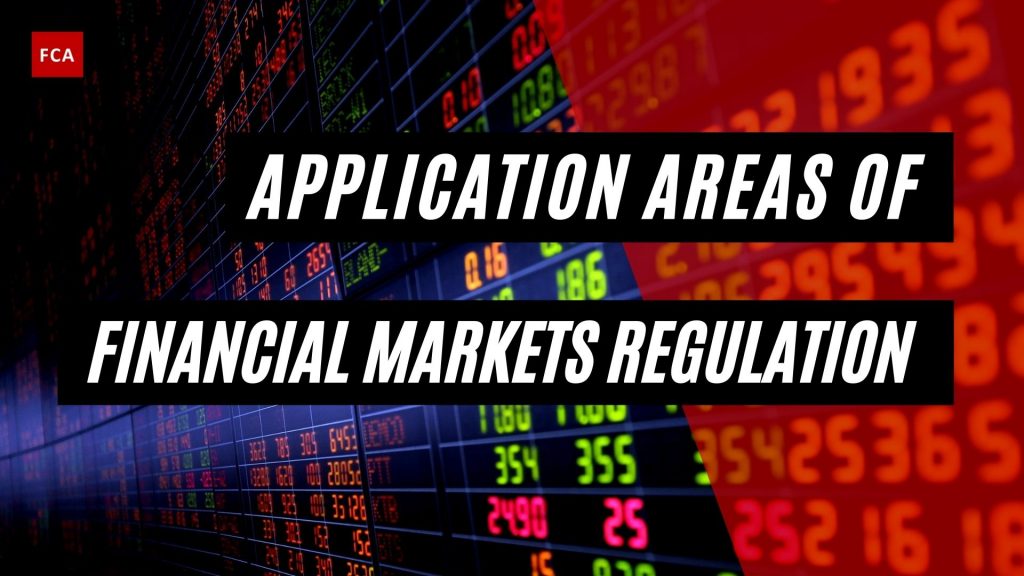Application areas of financial markets regulation. The financial institutions are required to implement strong Markets Compliance governance, policies, and, processes to foster the culture of compliance and application of financial market regulations. Without sound regulatory and, supervisory institutions, the negligent behavior of financial market players looms large in a liberal financial system.

Application Areas Of Financial Markets Regulation
Cross-border and cross-sectoral financial market integration exacerbates these governance problems as well as the problems of dealing with individual market players. Various application areas are suggested by the regulators to the investment companies, advisors, and brokers, that must be applied by them while dealing with potential investors or clients.
The emergence of the international financial ‘architecture’ about the growth of global financial markets, resulted in fundamental shifts in the financial system, and its governance which is closely linked to the increased financial instability. Financial architecture that harnessed market forces as a tool of governance led directly to the growing incidents of crisis. It also greatly strengthened the influence of private actors as public authorities became dependent on the information and expertise provided by private agents in a fast-moving market environment.
These developments, encouraged by states themselves, strengthened the power of private agents to shape and set rules. The dynamic interaction of the changing market regulatory environment shifted the institutionalized patterns of financial market governance.
Global Financial Crisis
The global financial crisis has necessitated the reconsideration of even basic principles of financial regulation. Meanwhile, the imperative of financial development remains as strong as ever in emerging markets, although the focus is more on basic elements such as strengthening financial market systems and widening the scope of governance of the financial system, rather than sophisticated instruments and innovations. The financial markets have proved to be more robust and less affected by the global turmoil compared to their advanced economy counterparts it will be important to carefully filter out the right lessons from this outcome.
The crisis has highlighted the need for strengthening financial systems to make them more resilient to shocks. Emerging markets face particular challenges in stabilizing their nascent financial systems in the face of shocks, both domestic and external, and financial reforms are critical to these economies as they attempt to pursue sustainable high-growth paths.
New paradigms for financial development and regulation will have to be suitably reframed for emerging markets, which have several varying institutional and capacity constraints. Low-income countries, where the breadth of formal financial systems is severely limited, pose an even greater set of conceptual and practical challenges.
Market Regulations
The application of market regulations requires safeguarding the interest of prospective investors, clients, and creditors. Further, to fairly deal with clients, it is mandatory for all companies dealing in securities, instruments, bonds, shares, etc. to have themselves credit rated by the approved credit rating agency.
The credit rating will be an ongoing process i.e. credit rating must be updated regularly, such as within six months from the date of close of each financial year and, the company’s rating report should be submitted to the financial market regulatory authority of the jurisdiction. The credit rating of the company should be made public. The companies shall disclose their credit rating prominently in their published annual and quarterly financial statements.
Markets compliance regulations require that companies should refrain from adopting any practices whereby they would either artificially or temporarily show an ostensibly different financial position of the companies’ financial statements. Companies including investment companies, brokers, and other financial markets are required to take care in showing their deposits, investment transactions for the clients, financial assets, provisioning, profit, or any other method to artificially inflate the financial position, to attract the potential clients or investors.
Marlet compliance regulations require that companies should not enter into investments, or trade with their directors, officers, employees, or related persons who either individually or in concert with family members beneficially own a certain percentage % or more of the equity of the company.
Companies should not take unsecured exposure on, or take exposure against the guarantee of any of their directors, any firm or private company in which the company or any of its directors are interested as director, proprietor, or partner, and their Chief Executive and shareholders holding the share capital of the company, in which they are interested as partners, directors or shareholders holding the share capital of that company.
Final Thoughts
Investment limits are prescribed by the Markets Compliance regulations where investment companies are restricted to invest the amount over the prescribed percentages of the aggregate equity of the respective company. Within the limits, companies may take maximum exposure as per the applicable Markets Compliance requirements. The exposure limit for future contracts usually includes both positions taken in futures transactions. The exposure as a result of strategic investment and, investment in the units of Mutual Funds, are usually considered part of the limits.








